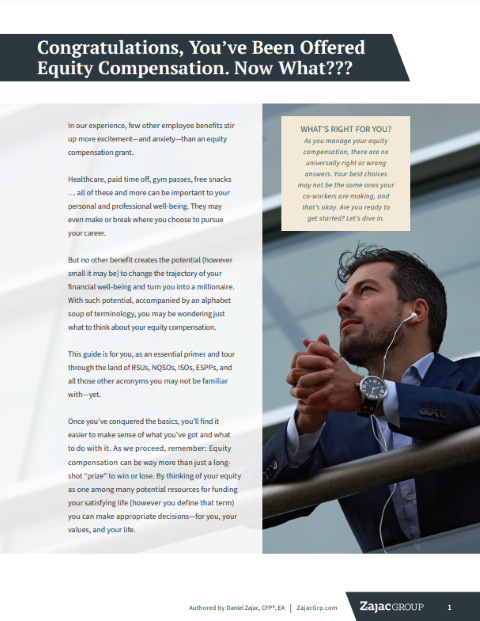
Unfortunately, the ambiguity associated with the statement, “an inappropriately diversified portfolio,” is part of what makes identifying, addressing, and exiting a concentrated position so difficult.
For some, concentration risk might mean holding any amount of a single stock position in a company they work for. For others, concentration might feel suitable if they have significant other assets and/or if they have a high risk tolerance or high risk capacity.
If you’re looking for a benchmark, one rule of thumb suggests that you are exposed to concentration risk if you hold more than 10-15% of your net worth in a single stock position.
Ultimately, concentration risk is a magnified risk/reward tradeoff. The concern for investors is that the lack of a diversified portfolio increases the risk that a substantial portion of your investment might be meaningfully reduced or eliminated in short order.
Why Do People Put Off Reducing Concentration Risks?
Assuming there is so much to lose, most people would agree, it makes good, general sense to avoid excessive concentration risk. And yet, many recipients of equity compensation struggle to pull the trigger on this otherwise prudent practice. Here are a number of reasons we’ve seen.
GET THIS GUIDE
When it comes to your finances, it's important to understand what you have, what you should consider, and how it can impact your personal goals. This guide is the best place to start.
Reason #1 – Company Loyalty: You don’t want to appear disloyal to the company that created your current wealth. It may feel like you’re selling out of its future, and/or a piece of your soul. You may also rely on the fact that you know, interact with, and believe in the employees/owners of the company. These factors might lead to overconfidence in the stock, and its future price expectations.
Reason #2 – A Belief that the Stock Will Go Up: Fear of missing out, or fear of making a mistake on the sale of your stock (particularly if it has been outperforming), may influence your decision not to sell and diversify. Unfortunately, by not wanting to miss out on what might be more upside on the stock by unloading too much of your stake, too soon, you also risk losing out on a bird in hand if you keep the stock and the price decreases.
Reason #3 – Price Anchoring: If your company’s stock has declined in value from a previous high-water-mark, you may “wait until it gets back.” Unfortunately, nothing tells us that the stock will ever get back to a previous high, or how long it might take if it does. Even if the price does reach your target, you may “change your mind,” deciding to wait a little longer. Before you know it, you’re unsure just when to sell.
Reason #4 – Company Restrictions: In a post-IPO or long-term public company, you may be subject to lock-ups (post-IPO) and blackout windows prohibiting you from buying or selling positions, even if you wanted to. Or, as an executive, you may be subject to pre-clearance, section 16 reporting, or restrictions. One strategy to consider particularly for those with significant wealth or instant wealth could be a 10b5-1 plan.
Reason #5 – Tax Tradeoffs: So much of equity compensation and the decision to sell (or not sell) is tied to income tax. You might seek to defer income tax, simply, by not exercising options or selling shares. Or, you may seek to optimize tax via an exercise and hold of incentive stock options (or exercise NQSOs early and file an 83(b)). While tax aware decision-making is an important part of equity compensation planning, you may have to decide which is more important to you: deferring or avoiding taxes, or reducing concentration risk? Often, you can’t have both, and by trying to be tax efficient, you may end up with less overall wealth should the stock price go down.
Reason #6 – Adequate Diversification: If you hold substantial other assets, or assets that you believe are appropriately diversified investments in your personal portfolio, you may decide you’re okay with taking excess concentration risk with your company equity.
Reason #7 – Fear/Indecision/Regret: What if you make your move, and it turns out to be a mistake? Somehow, inaction often feels “safer,” even though no decision is a decision after all.
As you can see, there are plenty of reasons equity compensation recipients can point to, for remaining overly concentrated in their company account. Some of the reasons are quite valid, such as a blackout period. Others may depend on the circumstances, and whether the rationale is part of a personalized financial plan, or just a justification for what you know, deep down, is a dicey proposition.
Four Reasons to Mitigate Concentration Risk Sooner Rather than Later
Now that we have addressed factors that might interfere with your willingness to reduce concentrate risk, let’s review some reasons that should persuade you to act:
Reason #1 – Low Risk Tolerance and/or Low Risk Capacity: As an investor, you have low risk tolerance if you don’t want to see a lot of volatility in your investment accounts, or you are willing to give up growth for lower volatility and lower expected returns. A low risk capacity means you literally cannot afford to lose the value of the equity. If you fall into either or both of these categories, reducing concentration risk should be of utmost priority.
Reason #2 – Extra-Concentrated Equity Compensation: Concentration risk is risky enough when you’re holding too much of a single stock in your personal investment portfolio. When your livelihood is tied to the same company, you face double threats: concentration risk AND career risk. In other words, if your company takes a dive and its stock price stumbles, this can damage both your personal wealth, as well as your position in the firm and all its benefits, including wages, healthcare coverage, matching 401(k) contributions, bonuses, and more.
Reason #3 – Opportunity Costs: It’s prudent to ask yourself: Is holding a concentrated position in your company stock is a good idea? If so, is it the BEST idea for your investable assets? Or could it be reinvested elsewhere, and generate higher expected returns and/or lower risk for similar returns? To quote Nobel Laureate economist Efficient Bill Sharpe, “Diversify, diversify, diversify! The closer you come to holding the entire market portfolio, the higher your expected return for the risk you take. … Remember, if you bet that market prices are wrong [by investing heavily in a single stock or sector], you have to be able to justify why you’re right and the market isn’t.”
It’s also possible its highest use may be to fund your lifestyle, such as sending your kids to a great college. Or simply, maybe you just need some cash. Either way, if the money could be better used elsewhere, you’re incurring opportunity costs by postponing the move.
Reason #4 – Reduced or Eliminated Tax Impact: If you do choose to prioritize tax savings over reducing concentration risks, consider selling when your shares have reached tax-efficient. For vested RSU or exercised NQSO shares, this might be when their Fair Market Value (FMV) is less than their cost basis, or when shares are held for more than a year. For ISOs, this should be when shares become qualified, thus subject to long-term capital gain rather than ordinary income tax rates. (All else equal, long-term capital gain tax rates are preferred to ordinary income rates.) At these points, tax impacts are reduced if not eliminated, so your tax mitigation goals may have been reached. If so, you may find it’s time to unload the shares.
However, if you go this “taxes first” route, consider our comments from A Quick Take on the Tax Treatment of Incentive Stock Options:
“To avoid letting the tax tail wag your wealth dog, it might help to think of your stock options as simply more pay for services rendered. Even worst case, the tax rates on your ISOs will never be any higher than the ones you pay on your regular paycheck. If you frame it like that, it should be easier to decide what’s really best for you and your equity compensation.”
Potential Action Plans for Reducing Excess Concentration Risk
Depending on your end goal, there are several ways you can address excess concentration risk. Here are three scenarios to illustrate, ranging from selling it all, holding it all, or striking a balance.
Scenario #1: Your only goal is to mitigate the most risk and build investment wealth.
Proposed Actions: Sell all your company stock as soon as possible and reinvest the proceeds in your personal, globally diversified investment portfolio.
Comments: Depending on your previous actions and the type of equity compensation received, this approach may be relatively tax-inefficient, particularly if you have disqualified ISOs. But it may still make the most sense if the goal is to reduce your concentration risk and seize the expected opportunity costs sooner than later. This may be especially practical if you want/need to mitigate risk and have substantial future value tied up in unvested options or unvested RSUs, effectively forcing you to have significant skin in the game.
Scenario #2: Your goal is to retain some company stock for future growth, but reduce your concentration risk to less than 10%–15% (or whatever number is suitable for you).
Proposed Actions: Even if it would be a struggle to quickly reach the less than 10%–15% target, there’s no time like the present to get started. Based on your net worth, your current equity, and your company’s stock price, you can begin to strategically and tactically plan to liquidate some of your stock shares now and keep others for the future. You might:
- Sell tax-efficient stock, such as stock at a loss or at long-term capital gains rates.
- Exercise and sell options, or do a net-exercise and retain some shares.
- Perform a stock swap when exercising your options, to mitigate shares held.
- Gradually exercise ISOs within your AMT comfort zone (or the AMT crossover point).
- Take a tandem exercise and sell of NQSOs with an exercise and hold of ISOs in same year.
- Exercise ISOs in a high income year, to avoid AMT.
- Consider hedging strategies like a cashless collar, prepaid forward variable, or an exchange fund (if eligible for all).
- If you’re charitably inclined, establish a Donor Advised Fund for low-basis stock, or a Charitable Remainder Trust if you are seeking to generate income from low-basis stock. Either might mitigate concentration risks and
Comments: Planning for when, how, and how much stock to liquidate intersects the art and science of financial planning. It’s a balance of goals, objectives, opinions, facts, and techniques. Should you rip off the proverbial bandage all at once? Proceed more gradually? Do a bit of both? As usual, it depends on your particulars.
A Helping Hand
We’ve touched on just a few strategies for reducing company stock concentration risks. With all the complexities involved, it’s no wonder many equity compensation holders end up locked in indecision about how to proceed. But remember, by not deciding, you’re still making an unintentional choice to remain exposed to concentration risk.
Given the many nuances and varied possibilities, it can help to partner with an informed and objective third party to help sort them out and jump-start your efforts. Please let us know if we can answer additional questions.
This material is intended for informational/educational purposes only and should not be construed as investment, tax, or legal advice, a solicitation, or a recommendation to buy or sell any security or investment product. The information contained herein is taken from sources believed to be reliable, however accuracy or completeness cannot be guaranteed. Please contact your financial, tax, and legal professionals for more information specific to your situation. Investments are subject to risk, including the loss of principal. Because investment return and principal value fluctuate, shares may be worth more or less than their original value. Some investments are not suitable for all investors, and there is no guarantee that any investing goal will be met. Past performance is no guarantee of future results. Talk to your financial advisor before making any investing decisions.






0 Comments